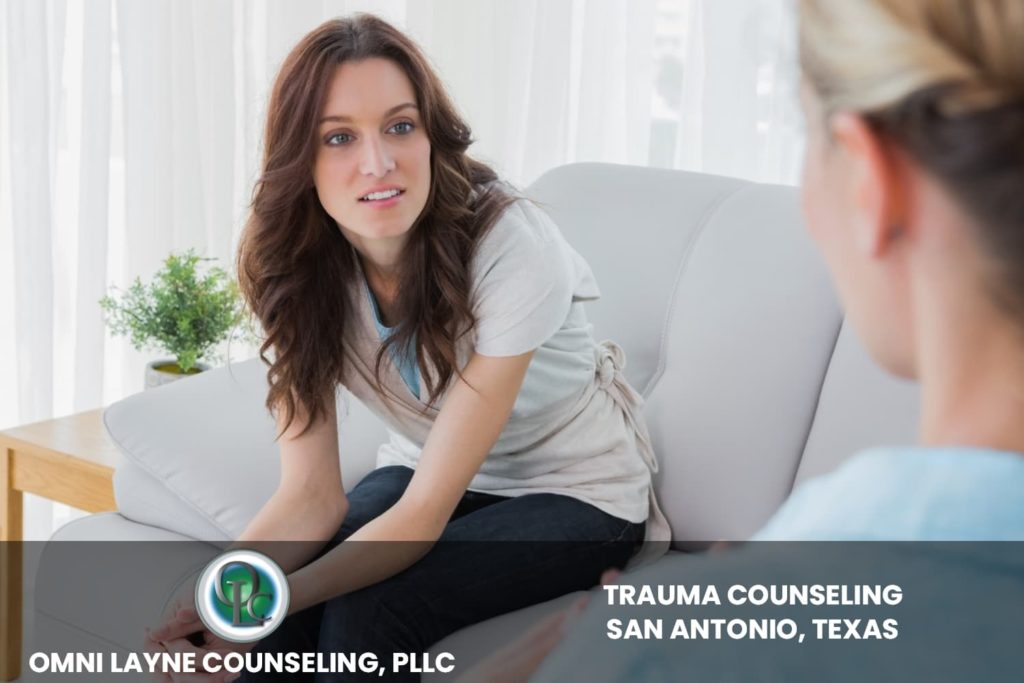Trauma Counseling
with Omni Layne Counseling, PLLC
3740 Colony Dr #122, San Antonio, TX 78230, United States
Located in Colonies North Professional BLD

Trauma is a person’s emotional reaction to a traumatic situation. Few people go through life without experiencing some form of trauma.
Unlike typical trials, traumatic experiences are unexpected and immediate, represent a major threat to life (such as bodily injury or death), and feel out of a person’s control.
Most importantly, incidents are distressing to the point where they undermine a person’s feeling of safety in the world and generate the impression that disaster could strike at any time.
Childhood parental loss, car accidents, physical abuse, sexual assault, military combat experiences, and the untimely loss of a loved one are all examples of traumatic occurrences.
Acute Trauma: Acute trauma is characterized by acute distress in the immediate aftermath of a one-time occurrence, and the reaction is brief. A car accident, a violent or sexual attack, or the unexpected death of a loved one are all common examples.
Chronic Trauma: Harmful incidents that are repeated or sustained might result in chronic trauma. It can arise as a result of prolonged bullying, neglect, abuse (emotional, physical, or sexual), or domestic violence.
Complex Trauma: Complex trauma can occur as a result of suffering recurrent or many traumatic incidents from which there is no way out. The feeling includes a sense of being trapped. It, like other types of trauma, can damage one’s feeling of security in the world and lead to hypervigilance, or the constant (and exhausting!) monitoring of one’s surroundings for the possibility of a threat.
Secondary or Vicarious Trauma: Occurs as a result of witnessing other people’s suffering and can affect those who work in professions that are relied upon to respond to injury and mayhem, such as physicians, first responders, and law enforcement. Over time, such people are vulnerable to compassion fatigue, a condition in which they stop emotionally investing in others in order to protect themselves from experiencing distress.
Adverse Childhood Experiences (ACE): Refers to a wide range of stressful experiences that children face or observe as they grow up, before they have established adequate coping strategies. ACEs can interrupt the normal developmental process, and the emotional damage can endure far into adulthood. The most prevalent sorts of Adverse Childhood Experiences are parent loss, neglect, emotional, physical, or sexual abuse, and divorce.
Disturbing experiences stimulate the amygdala, a region in the brain that detects threats. It replies by alerting multiple body systems to prepare for defense. The sympathetic nervous system goes into overdrive, causing the release of adrenaline, noradrenaline, and stress hormones, which prepare the body for a fight-flight-or-freeze reaction.
Fear, anxiety, shock, and anger/aggression are all common reactions to trauma. Such bad emotions fade when the crisis passes and the experience fades from memory, but for other people, the distressing sentiments endure, interfering with daily living.
Long-term trauma survivors may experience emotional disorders such as excessive anxiety, anger, grief, survivor’s guilt, disassociation, the inability to feel pleasure (anhedonia), or PTSD (post-traumatic stress disorder).
The amygdala becomes overactive, causing an outpouring of stress hormones as a result of its overreaction to tiny perturbations.
People who are in defensive mode and constantly alert to the prospect of a threat may have chronic problems with sleep or physical pain, endure turbulence in their personal and professional relationships, and have a lowered feeling of self-worth.
Positive psychological improvements can also occur after trauma when people realize their challenges and perceive themselves as survivors rather than victims of a traumatic experience.
These can include developing resilience, good coping skills, and developing a sense of self-efficacy.
Some people may experience post-traumatic growth, which includes developing better relationships, reinventing their relationships with new meaning and/or spiritual purpose, and developing a greater respect for life. It may appear counterintuitive, yet post-traumatic growth can coexist with PTSD.
Trauma, if left neglected or untreated, may devastate relationships and wreck havoc on personal and professional life. There are numerous treatment options available for persons suffering from short- or long-term trauma symptoms.
Consider lifestyle changes as an early treatment option. Eating well, exercising, abstaining from alcohol and drugs, getting enough sleep, seeing loved ones on a regular basis, and emphasizing self-care can all help to alleviate trauma symptoms.
Psychotherapy can assist a person in developing resilience, coping skills, and addressing unresolved feelings that are keeping them stuck. Two of the more dependable treatments for trauma and PTSD are exposure therapy and cognitive reappraisal therapy.
Trauma-informed care considers the full person, including past trauma and any maladaptive coping mechanisms that the individual may have developed in order to survive their painful experience.
Trauma-focused cognitive behavioral therapy is frequently used to address the damaging effects of early trauma, and it has shown especially beneficial to youth with PTSD and mood problems caused by abuse, violence, or unresolved sorrow.
There are numerous fallacies regarding trauma that obstruct understanding and treatment.
For example, there is a widespread belief that all childhoods are traumatic, leading people to misinterpret ordinary hardship or pain as actual trauma. While this perspective on trauma may appear to validate a terrible experience at first, it can rapidly cause individuals to question their own childhood experiences as well as the appropriateness of their caregivers.
Another widespread misperception regarding trauma is that it will permanently wreck your life.
Some trauma survivors adopt the victim persona, expecting the world to damage them and seeing slights where none exist; this inclination has contributed to the creation of a victim culture that causes more harm than good by neglecting people’s capacity for growth through adversity. Allowing people to shed the victim label allows them to see themselves as survivors, allowing them to grow and feel hopeful about the future.
It is commonly considered that discussing bad feelings and experiences leads to recovery. However, facts show that reliving painful memories after catastrophic events, particularly large-scale disasters or wars affecting thousands of people, can be risky. As a result, interventions like psychological debriefing should be used with caution and on a case-by-case basis.
Everyone’s experience with trauma will be unique.
What is the next step?
If you or someone you love is considering individual therapy or counseling, please contact Omni Layne Counseling. We are a team of professionals who have expertise to help.
Call us at our office to schedule an appointment with one of our highly skilled clinicians at Omni Layne Counseling, PLLC.
